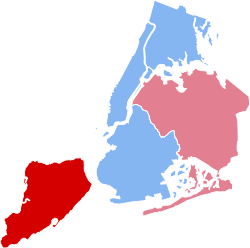| ||||||||||||||||||||
| Registered | 3,715,022 | |||||||||||||||||||
|---|---|---|---|---|---|---|---|---|---|---|---|---|---|---|---|---|---|---|---|---|
| Turnout | 1,520,443 40.93% ( | |||||||||||||||||||
| ||||||||||||||||||||
Bloomberg: 50–60% 60–70% 70–80% 80–90% Green: 40–50% 50–60% 60–70% 70–80% 80–90% | ||||||||||||||||||||
| ||||||||||||||||||||
| Elections in New York City |
|---|
 |
The 2001 New York City mayoral election was held on November 6, 2001.
Contents
- Background
- Republican primary
- Candidates
- Results
- Democratic primary
- Candidates 2
- Campaign
- Debate
- Results 2
- Run-off
- General election
- Candidates 3
- Campaign 2
- Debate 2
- Results 3
- Notes
- References
Incumbent Republican mayor Rudy Giuliani could not run again due to term limits. As Democrats outnumbered Republicans by a five-to-one margin in the city, it was widely believed that a Democrat would succeed him in City Hall. Businessman Michael Bloomberg, a lifelong Democrat, changed his party affiliation to run as a Republican. Mark Green narrowly defeated Fernando Ferrer in the Democratic primary, [nb 1] surviving a contest that divided the party and consumed the vast majority of the Green campaign's financial resources.
After a campaign largely overshadowed by the 9/11 terrorist attacks, Bloomberg won the general election with 50.3% of the vote to Green's 47.9%. Democrats flipped the boroughs of Manhattan and Brooklyn from the previous election. This is one of two mayoral elections where the winning candidate carried a minority of the boroughs, the other being the 1969 election.





